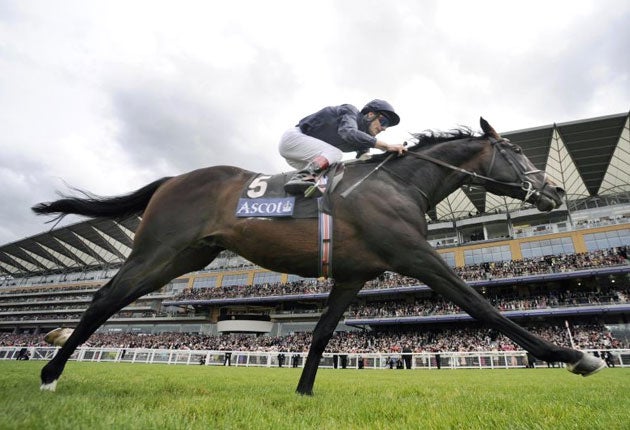Yeats extends the scale of greatness
Fourth Gold Cup victory elevates horse and trainer to unique place in firmament

How do you measure a horse like Yeats? By the bald fact that he yesterday became the first to win the Gold Cup four times? Or maybe by some other detail – for instance, that the animal he beat by three and a half lengths, Patkai, was in turn dragged fully 15 lengths clear of the rest? Or that he has now galloped 10 miles here, without once being remotely menaced with defeat?
You could do all that, just as scientists can tell you how many miles divide us from the moon, or the sun, or Neptune. But nobody can measure the firmament itself, and at the age of eight Yeats has now transcended every conventional gauge. He can only be measured in the way of cosmologists, who turn questions upon themselves, and treat infinity as a way of learning more about their own mortality.
Something of that sense suffused the man riding this paragon. "The world is in turmoil at the moment," Johnny Murtagh said afterwards. "But when you see the crowd, see people's faces when the horses come back into the ring, there's such a feeling of happiness. If you could bottle it, it would be something special. The brewing of the crowd for the last furlong carried the horse home. I felt something very special going past the line. I've never experienced anything like it."
Murtagh had kept Yeats handy throughout and settled the race when kicking clear off the home turn. In the process, Yeats not only left Patkai and company in his wake, but the phantoms of so many past champions: the likes of Sagaro, the only other triple winner, or Le Moss and Ardross, whose fame was to share as many consecutive runnings between them as Yeats has now won in his own right.
It is their intangible testimony, of course, that gives substance to his greatness – and purpose to those who been returning to this heath since 1711. The Gold Cup itself was first run in 1807. The inherited breadth of perspective is one no generation could achieve on its own, and one available even to the least curious bystanders here yesterday.
And for all the ripples of his genius that will spread out through the breed, thanks to the stallions he has produced for John Magnier and Coolmore Stud, to the racing public it is the perennial runners – first the triple champion hurdler, Istabraq, now Yeats – who have exalted Aidan O'Brien in the pantheon of great trainers.
As always, O'Brien was anxious to distribute the credit. "I can't tell you how privileged I feel," he said. "It's the people directly involved that make it happen, like the lad who rides him every day, Davey [Hickey]. The only time I felt this much pressure was with Istabraq. I was afraid of the disappointment for everyone if this didn't happen. It's not for no reason that this has never been done before. This is just a unique horse. He's made of different stuff. Of course, he's only flesh and blood, but to do this four times..."
O'Brien also paid tribute to the conviction Murtagh showed in committing when he did – at a time, sophists might wish to remark, when Patkai was trapped behind and still full of running – but Magnier had the sense to acknowledge the mastery of the trainer. "To keep a horse sound, and keep having him right for a particular day, is very hard," he said. "History shows that. To get a horse ready at this time of life – and he's a colt, not a gelding – is some performance."
To many, the years had finally seemed to be telling when Yeats ran deplorably on his reappearance. "But the trainer was always happy," Magnier said. "The Gold Cup is run in June, here, not at Navan in April. I think Aidan was of the view you can only ask him so many questions so many times, and it wasn't until the last two pieces of work that we really started getting the good vibes."
The obvious question now is whether Yeats will be asked those questions afresh next year. O'Brien seemed nervous of the prospect. "If anything was to happen to him, we know we can't replace him," he said. "He's so unique that I would be afraid of racing him after this."
Magnier deferred the matter, but there were grounds to wonder in the way he addressed the hope of seeing him in the Goodwood Cup next month. "Why would you stop now with a horse that's enjoying himself like he has done today?" he asked. "The people love seeing him, and we love going racing with him."
Asked to rank Yeats in his affections, after decades of achievement at Coolmore, Magnier gave a quizzical look. "He's a horse!" he smiled. But the tone would have been precisely the same, were he describing a star.
Join our commenting forum
Join thought-provoking conversations, follow other Independent readers and see their replies
Comments